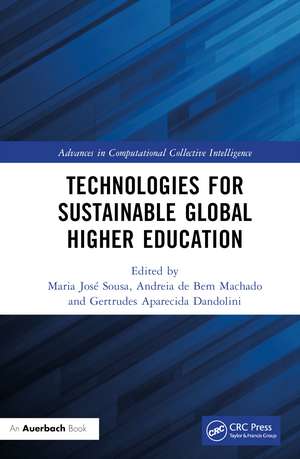Technologies for Sustainable Global Higher Education: Advances in Computational Collective Intelligence
Editat de Maria José Sousa, Andreia de Bem Machado, Gertrudes Aparecida Dandolinien Limba Engleză Hardback – 11 sep 2023
The chapters in this edited collection seek to answer questions relevant to the context of higher education, such as:
- What is the concept of digital technologies?
- How is digital technology used to mediate the learning process?
- What technologies are used to qualify education in higher education?
| Toate formatele și edițiile | Preț | Express |
|---|---|---|
| Paperback (1) | 420.20 lei 6-8 săpt. | |
| CRC Press – 19 dec 2024 | 420.20 lei 6-8 săpt. | |
| Hardback (1) | 819.90 lei 6-8 săpt. | |
| CRC Press – 11 sep 2023 | 819.90 lei 6-8 săpt. |
Preț: 819.90 lei
Preț vechi: 1024.88 lei
-20% Nou
Puncte Express: 1230
Preț estimativ în valută:
156.88€ • 164.24$ • 129.81£
156.88€ • 164.24$ • 129.81£
Carte tipărită la comandă
Livrare economică 05-19 aprilie
Preluare comenzi: 021 569.72.76
Specificații
ISBN-13: 9781032262895
ISBN-10: 1032262893
Pagini: 274
Ilustrații: 22 Tables, black and white; 80 Line drawings, black and white; 80 Illustrations, black and white
Dimensiuni: 156 x 234 x 18 mm
Greutate: 0.52 kg
Ediția:1
Editura: CRC Press
Colecția Auerbach Publications
Seria Advances in Computational Collective Intelligence
ISBN-10: 1032262893
Pagini: 274
Ilustrații: 22 Tables, black and white; 80 Line drawings, black and white; 80 Illustrations, black and white
Dimensiuni: 156 x 234 x 18 mm
Greutate: 0.52 kg
Ediția:1
Editura: CRC Press
Colecția Auerbach Publications
Seria Advances in Computational Collective Intelligence
Public țintă
PostgraduateNotă biografică
Maria José Sousa is a University Professor at ISCTE, a research fellow at Business Research Unit, and a collaborator of IPPS-ISCTE. She is also an expert in digital learning and digital skills, as she has assumed a Post-Doc position from 2016-2018, researching that field, with several publications in journals with high impact factor (Journal of Business Research, Journal of Grid Computing, Future Generation Computer Systems, and others). She is collaborating as an expert in digital skills with Delloite (Brussels) for a request of the European Commission in the creation of a new category regarding digital skills to be integrated with the European Innovation Scoreboard (EIS).
Andreia de Bem Machado holds a doctorate of philosophy degree in Engineering and Knowledge Management from the Federal University of Santa Catarina (UFSC), Florianópolis, Brazil, and a master’s degree in Scientific and Technological Education from UFSC. She is a specialist in graduate studies in pedagogy at Santa Catarina State University, Florianópolis, and in management processes. She currently participates in the Athena Project and is in postdoctoral studies at the UFSC.
Gertrudes Aparecida Dandolini is a professor at the Federal University of Santa Catarina (UFSC), Florianópolis, Brazil. Previously, she was a professor at the Federal University of Pelotas, Brazil, between 2003 and 2007, where she was a course coordinator. She is currently the leader of the Research Group on Intelligence, Management and Technology for Innovation (IGTI) and member of ENGIN-Engenharia da Integration and Knowledge Governance.
Andreia de Bem Machado holds a doctorate of philosophy degree in Engineering and Knowledge Management from the Federal University of Santa Catarina (UFSC), Florianópolis, Brazil, and a master’s degree in Scientific and Technological Education from UFSC. She is a specialist in graduate studies in pedagogy at Santa Catarina State University, Florianópolis, and in management processes. She currently participates in the Athena Project and is in postdoctoral studies at the UFSC.
Gertrudes Aparecida Dandolini is a professor at the Federal University of Santa Catarina (UFSC), Florianópolis, Brazil. Previously, she was a professor at the Federal University of Pelotas, Brazil, between 2003 and 2007, where she was a course coordinator. She is currently the leader of the Research Group on Intelligence, Management and Technology for Innovation (IGTI) and member of ENGIN-Engenharia da Integration and Knowledge Governance.
Cuprins
Preface. Editors. Contributors. Introduction: Is a Seamless Learning Experience Design Framework an Answer to Attaining Quality Digital Learning in Higher Education? 1 A Comprehensive Review of the Literature on Digital Higher Education Pedagogies. 2 Digital Education Knowledge from Theory to Teaching Experiences in Three European Universities. 3 Skills for Safety, Security, and Well-Being in the DigComp Framework Revision and Their Relevance for a Sustainable Global (Higher) Education. 4 Digital Technologies as a Key Driver of Sustainable Global Higher Education. 5 Higher Education: Networks and Technology – The Complex World of Sustainability. 6 Artificial Intelligence and Blockchain in Higher Education Institutions: A Bibliometric Review. 7 Educational Strategies in Smart and Sustainable Cities for Education in the Post-Covid Era. 8 Accounting Education: New Pedagogies and Digital Approaches Based on the Research Agenda. 9 International Mobility Challenges in Higher Education in the Digital Era. 10 Artificial Intelligence: Applicability of This Technology to Higher Education – A Scoping Review. 11 Case Study of Two Higher Education Institutions in the Use of a National MOOC Platform toward Sustainable Development. Index.
Descriere
Digital technologies are influencing the way we learn, live, and work. Universities globally are investing in their own e-learning platforms. This development is driving research in the pedagogical aspects of teaching and learning process. Within this context, the book analyzes the application of digital technologies to this process.











